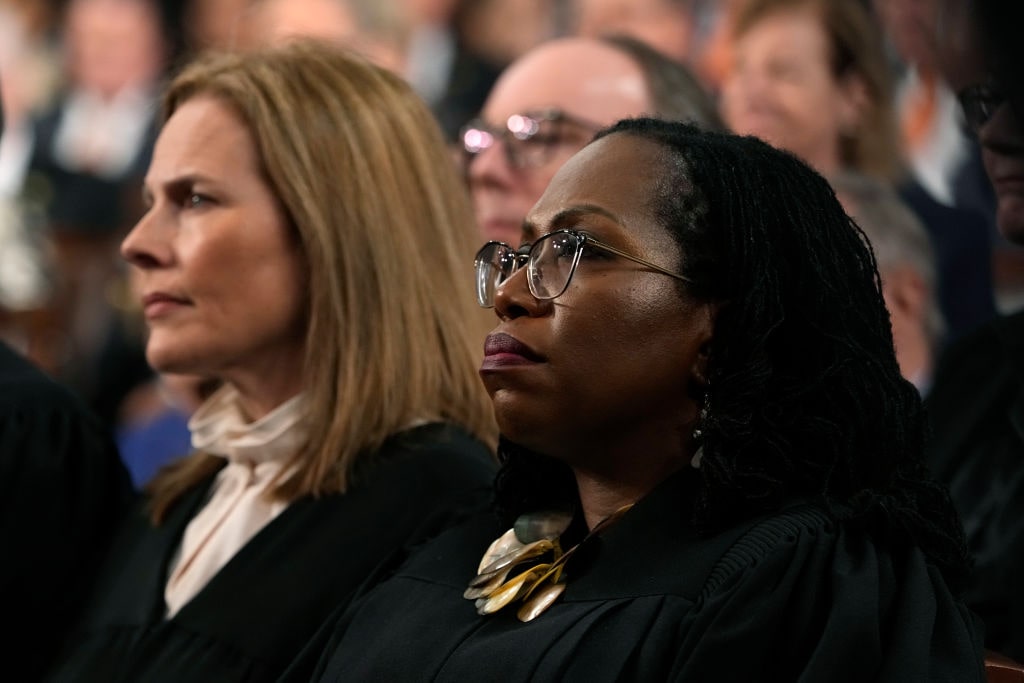A January 6 convict convinced the Supreme Court that the Biden DOJ improperly charged him via a novel use of a financial crimes law. The 6-3 decision in Fischer v. US affects over 350 defendants charged similarly, including, perhaps, Donald J. Trump. Why did Biden’s DOJ use it against so many Jan 6 defendants? It turned misdemeanor trespassing into a felony carrying a 20-year sentence – a fearsome cudgel against the pro-Trump protesters caught in the crosshairs of a government agency at war with its political enemies. More news in the case was that Justice Ketanji Jackson – Joe Biden’s sole Supreme Court appointee – voted with the conservatives, while Trump’s last pick, Justice Amy Barrett, wrote the dissent.
Justices Jackson and Barrett Perturb Progressives
Jackson’s agreement with her conservative colleagues and Barrett’s dissent had two profound downstream effects, both devastating to the progressive movement. The campaign to undermine Supreme Court rulings has been well-received by the press and seemingly well-financed. Whether it’s a granular investigation into Justice Clarence Thomas’ RV pump-out fees or Justice Samuel Alito’s wife’s flag flying, the attempts have been a novel front line in the war against decisions leftists don’t like. That storyline, however, depends on 6-3 rulings along conservative/liberal voting blocs. The results here in Fischer just blew that argument right out of the water.
 The cases this term have not generally come down the line with 6-3 lineups according to the nominating party of the justice. That this Jan 6 case has two line-crossings – Barrett voting against the pro-Trump rioters and Jackson voting for them – is the coup de grace against claims of a tainted Court. The damage is done even if Trump’s immunity bid, likely to be released on July 1, is decided along those lines. Further, the case reveals that the Department of Justice has been massively overcharging defendants – as many anti-establishment types have argued.
The cases this term have not generally come down the line with 6-3 lineups according to the nominating party of the justice. That this Jan 6 case has two line-crossings – Barrett voting against the pro-Trump rioters and Jackson voting for them – is the coup de grace against claims of a tainted Court. The damage is done even if Trump’s immunity bid, likely to be released on July 1, is decided along those lines. Further, the case reveals that the Department of Justice has been massively overcharging defendants – as many anti-establishment types have argued.
Instead of faithfully applying the facts to the law, as Merrick Garland swore to do, the DOJ twisted and turned a law drawn up to prevent paper shredding in financial crimes into a hammer to smash into the heads of an ultra-rare group: Republican rioters. It’s hard to understate how much wind will never reach the sails of the progressive left due to Justice Jackson’s agreement that the most severe charges should never have been submitted to the grand jury. What about Justice Barrett – has she abandoned conservative principles? No. Her dissent is written from a conservative perspective.
How Broad Is the Law?
The controversy here concerns a provision of the federal law designed to fix a previously poorly written version. The Enron scandal revealed that federal law prohibited ordering someone else to shred documents corruptly, but not doing so upon one’s own volition. After that, Congress passed the Sarbanes-Oxley Act, including 18 U. S. C. §1512(c)(2) – the provision of federal law challenged in Fischer.
Chief Justice Roberts wrote:
“It would be peculiar to conclude that in closing the Enron gap, Congress actually hid away in the second part of the third subsection of Section 1512 a catchall provision that reaches far beyond the document shredding and similar scenarios that prompted the legislation in the first place.”
Justice Barrett’s argument is conservative because it does not come from results-oriented decision-making. It is a conservative position to say it is up to Congress to write laws and that Justices shouldn’t legislate. Barrett says the majority agree the rioters delayed proceedings and yet still rule as they did – why?
“Because it simply cannot believe that Congress meant what it said. Section 1512(c)(2) is a very broad provision, and admittedly, events like January 6th were not its target. (Who could blame Congress for that failure of imagination?) But statutes often go further than the problem that inspired them, and under the rules of statutory interpretation, we stick to the text anyway. The Court, abandoning that approach, does textual backflips to find some way — any way — to narrow the reach of subsection (c)(2). I respectfully dissent.”
Both newer justices likely angered the political bases of the party that put them on the Court, but they both ruled according to their respective judicial philosophies. Jackson wrote in a concurrence: “Our commitment to equal justice and the rule of law requires the courts to faithfully apply criminal laws as written, even in periods of national crisis, and even when the conduct alleged is indisputably abhorrent.” Ketanji Jackson is the only former public defender on the Court, and it shows here.
Nonviolent Jan 6 defendants will be helped the most by this ruling; we should expect new filings by those convicted of violating 1512(c)(2), challenging the convictions in light of this holding. Special counsel Jack Smith may want to amend his indictment of Donald Trump, which included a violation of the same statute.




